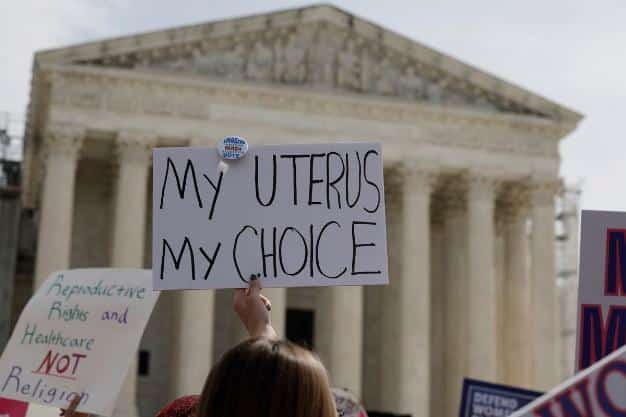
Supreme Court abortion rights rally, 26 March 2024/
Photo by Anna Moneymaker/Getty Images
Florida Supreme Court approves abortion restriction — and a ballot measure that would overturn it
The Florida Supreme Court struck down its state abortion protection — paving the way for a six-week ban on abortion passed in 2023 to take effect — but will allow voters to weigh in on whether they can amend the state’s constitution to explicitly enshrine abortion rights. The court issued two separate rulings on 1st April: one upholding a 15-week abortion ban passed in 2022, and another approving an abortion rights ballot measure to go before voters this November. The measure — which will need the backing of 60 percent of voters to pass, the highest threshold in the country — would amend Florida’s state constitution to explicitly guarantee abortion rights in the state up to fetal viability.
SOURCES: 19th News, by Mel Leonor Barclay and Shefali Luthra, 1 April 2024 ; Jessica.Substack.com, by Jessica Valenti, 1 April 2024
+++
Louisiana’s tough abortion law is creating a pregnancy care crisis
Nearly two years ago, Louisiana adopted one of the strictest anti-abortion laws in the country. There were predictions that the near-total ban would impact not just women who seek to end pregnancies, but pregnancy care in general. And that’s exactly what’s happened.… For miscarriages where the standard treatment is the same procedure as used in abortion, doctors and hospitals are hesitating or steering patients toward more invasive procedures, including C-sections that carry more risk and affect future ability to give birth vaginally.
SOURCE: Nola.com, by Stephanie Grace, 30 March 2024
+++
Can states legally ban emergency abortions?
The US Supreme Court will soon weigh whether Idaho’s near-total abortion ban trumps a federal law. Dr Lauren Miller, a maternal-fetal medicine specialist, had dreamed of opening an ob-gyn residency in Boise, Idaho, but she felt hindered by a recent state law making it a felony for doctors to provide most abortions. Although the law allows exceptions to save the life of the patient, many physicians and reproductive rights organizations argue that it requires a patient to be on death’s door before they can be treated. In an amicus brief submitted to the US Supreme Court this week in yet another abortion case that the justices will hear this term, Miller recalled treating a patient with kidney disease who was carrying two fetuses. The patient became sick with pre-eclampsia before the pregnancy was viable, and only one of the fetuses still had a heartbeat.
SOURCE: New Republic by Grace Segers, 30 March 2024
+++
Local Texas Republican Party officials support the death penalty for abortion and IVF patients
Leaked video footage of an Abolish Abortion Texas function shows Hood County Republican Party officials in attendance at a meeting supporting the death penalty for women and minors who seek out either abortion or IVF. The meeting took place in January 2024, but the video was only shared on X last week.
SOURCE: Yahoo.com, by Ellie Quinlan Houghtaling, 1 April 2024
+++
Constitutional right to abortion falls short in Maine Senate
A proposed constitutional right to abortion failed Monday by four votes to get the two-thirds majority support of Maine senators needed to send it to voters for approval in a referendum in a party-line vote.
SOURCE: Press Herald, by Rachel Ohm, 1 April 2024
+++
Tennessee House candidate talks to voters about her abortion
Candidates for political office often have personal reasons motivating them to run, but don’t always share them. A year ago, Allie Phillips was forced to leave her home state of Tennessee to terminate a non-viable pregnancy, one of the worst things she says that has ever happened to her. This year, she is taking her story door-to-door in her first bid for public office.
SOURCE: Tennessee Lookout, by Kelcie Moseley-Morris, 1 April 2024
+++
Urologist refuses to come to San Antonio for annual conference because of Texas abortion laws
A 39-year-old urologist and sexual medicine specialist based in California tweeted that she will not attend the American Urological Association’s annual conference in San Antonio, Texas, this year because of the state’s restrictive laws on reproductive rights. She was set to present her research at the May conference but announced via X that she felt unsafe coming to the state.
SOURCE: Texas Public Radio, by Kayla Padilla, 28 March 2024



